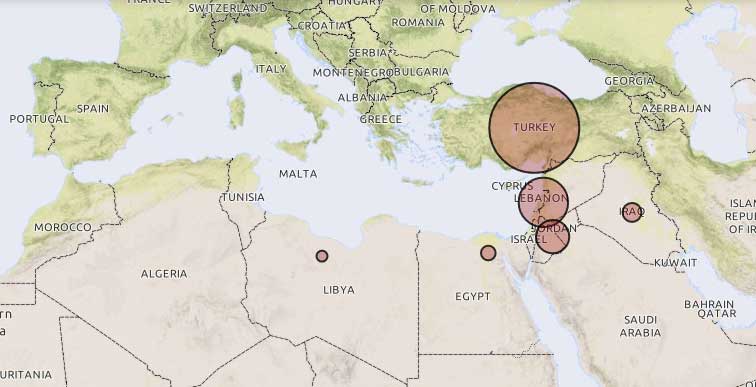There’s a lot of negativity brewing around the US lately regarding Syrian refugees in light of the terrorist attacks that took place in Paris last Friday. A little nervous fear would be understandable, but most comments that oppose the USA doing its part go well beyond that, sometimes in embarrassingly public displays in the case of the 31 US governors who’ve made a point to announce that their states won’t be accepting any refugees…
…even though it’s entirely a federal decision and they really don’t have much say in the matter…
Anyways, one thing that always bothers me is when misinformation drives things like this because at least for me it makes me question the real motives of those who choose to base their beliefs on details that aren’t necessarily even true. And that’s happened a lot with regards to the Syrian refugee crisis, so after finding some great data from the The Office of the United Nations High Commissioner for Refugees, I wanted to throw out a few stats to help dispel the biggest myth that I’ve been seeing:
Why should the U.S. take these refugees when the surrounding countries in the Middle East don’t even want them?!
In fact, the vast majority of Syrian refugees have stayed in region – namely in Turkey and Lebanon, which each are currently supporting 2+ million and ~1 million refugees, respectively.
Between the Middle East and Europe, some 5 million refugees have been accounted for, with about 86% in the Middle East and the remaining 14% seeking asylum in Europe.
In comparison, President Obama has committed the United States to supporting 10,000 refugees this year, or 0.5% of what Turkey has already accepted, and to date the United States has taken in around 2,000 refugees … or 0.04% of what the rest of the world is doing.
Just for reference, the country of Turkey has roughly 25% of the population that the USA has, their median household income is 28% of ours, and 10% of the Turkish people don’t have access to flush toilets.
Lebanon, on the other hand, is physically roughly half the size of New Jersey, has a GDP that’s less than 1/10th of Jersey’s, and has seen its own share of fighting as conflicts from the neighboring Syrian civil war have spilled onto Lebanese soil.
One last fun fact – today we currently have about 150,000 people of Syrian descent living in the United States, with New York City not surprisingly playing home to the majority, but additionally cities like Detroit, Boston, and Houston hosting large Syrian populations.
Personally, I agree with President Obama that it’s not in our character as Americans to turn away refugees considering the bloody civil war that their own country has been fighting for years. And I know that there’s lots of issues to support here at home, be it homelessness among vets or our own poverty, but really – at the end of the day – doesn’t this sort of feel like helping people in peril is something that The Greatest Country in the World should be a part of???
We can do more than one thing at a time. There are currently an estimated 50,000 homeless vets in America today, and we want to welcome 1/5 of that number as foreign refugees quite literally fleeing for their lives. The US is always bragging about solving the rest of the world’s problems – here’s one that we can help to fix and we don’t even need to take the lead ourselves.
We just have to do half of one percent of the work that Turkey is doing.
—
References:
- Syrian Regional Refugee Response – Regional Overview : data.unhcr.org
- Syrian Regional Refugee Response – Europe Syrian Asylum Applications : data.unhcr.org
- Paris Attacks Intensity Debate Over How Many Syrian Refugees to Allow Into the U.S. : nytimes.com
- List of Countries and Dependencies by Population : wikipedia.org
- Median Household Income : wikipedia.org
- Water Supply and Sanitation in Turkey : wikipedia.org
- Lebanon : wikipedia.org
- New Jersey : wikipedia.org
- Syrian Civil War Spillover in Lebanon : wikipedia.org
- Syrian Americans : wikipedia.org
